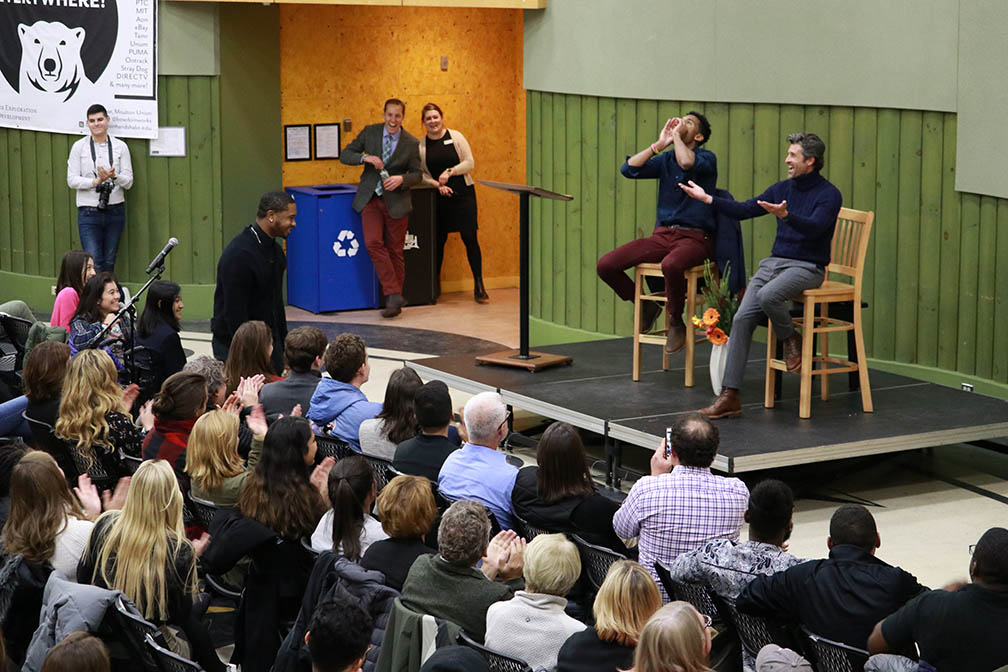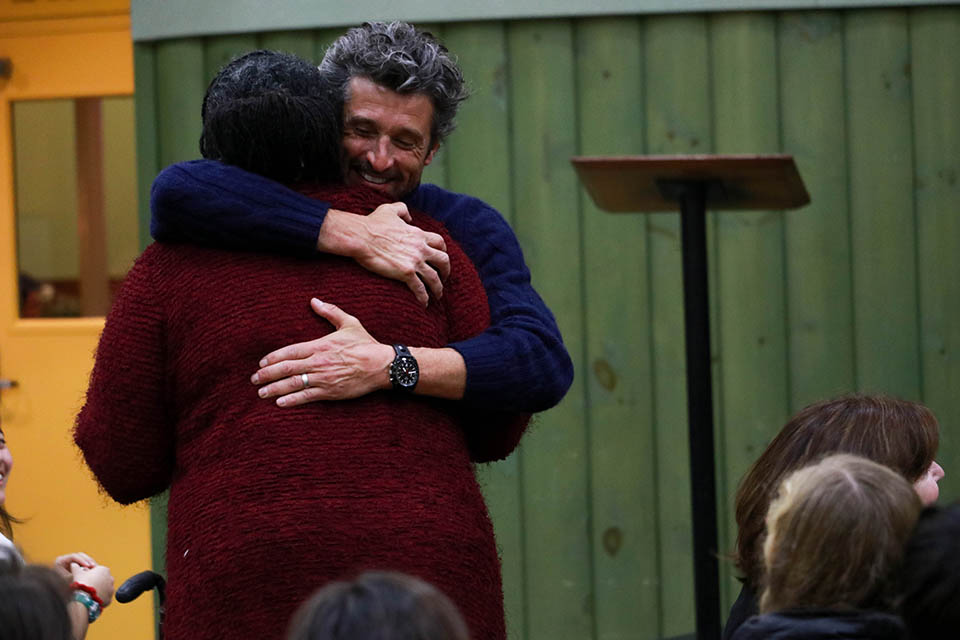Patrick Dempsey delivers No Hate November keynote, sharing experience with dyslexia
November 15, 2019
On Thursday evening, students packed David Saul Smith Union to hear Patrick Dempsey H’13, former star of the hit ABC show “Grey’s Anatomy,” deliver the annual No Hate November keynote address. Dempsey sat down with Marcus Williams ’21, Bowdoin Student Government (BSG) chair of diversity and inclusion, to discuss their experiences with dyslexia.
Dyslexia is a common learning disability that affects a person’s ability to interpret letters or symbols. An estimated 40 million adults in the United States are dyslexic, yet just two million have been formally diagnosed.
Dempsey is a frequent celebrity advocate for the disorder. Diagnosed at age 12, Dempsey explained to ABC News that he was placed in special education classes that did not express his needs before he realized he was dyslexic.
Raised in Buckfield, Maine, Dempsey attended St. Dominic Regional High School, but he dropped out before graduating. He traveled to New York City where he landed his first acting job. This brought new challenges, Dempsey remembered, such as reading and memorizing scripts.
“I would dread going to work,” said Demspey, speaking of his time on “Grey’s Anatomy.” “The medical terminology during table reads was painful.”
Williams invited Dempsey to give the keynote address. The two first met this summer when Dempsey spoke at Portland’s WEX office where Williams interned. After striking up a conversation in an elevator, the two bonded by sharing their experiences with dyslexia.
The two continued the conversation on stage, with Williams and Dempsey sharing their experiences with dyslexia during elementary school. Dempsey pointed out that while schools now have more resources to help students with dyslexia and other learning disabilities, there are still improvements to be made.
“A standardized system of education does not work for everyone. And that’s okay,” Dempsey said.
The keynote talk is part of No Hate November programming, an annual event at the College intended to shed light on issues affecting underrepresented or ethnic groups on campus. Past keynote speakers include civil rights activist Deray McKesson ’07 and comedian Aasif Mandiv.
In the BSG meeting minutes, before the students knew Dempsey would deliver the keynote address, some members of student government expressed their concern over bringing such a popular figure to campus for No Hate November.
“When they announced the event with Patrick Dempsey, I think it overtook the attention from the other events just because he’s such a famous figure,” said Kushi Patel ’23, the Residential Life representative of BSG.
The majority of the planning for No Hate November took place last year, including securing funds and space for speakers to visit. However, despite the early planning, since BSG members for the following year are not elected until March, there was little time for discussion as an assembly about No Hate November programming.
“It would be beneficial to talk about the work on the calendar [of No Hate November] more as an entire BSG,” said Angel Ramirez ’20, a member of the diversity and inclusivity committee. “Ideally with anything you want to have a giant discussion about it in a broader context, but a lot of this has to be done behind the scenes.”
Rather than creating events around a central theme for the month, BSG’s committee for diversity and inclusivity reached out to affinity groups on campus to find out what groups were working on.
“I wouldn’t say there are themes [for No Hate November’s planned events],” said Ramirez. “It’s more [about] trying to see what different pockets of the community are focused on or are doing and then trying to integrate that into the calendar. I think this year we are very diverse in the sense of what it is we’re trying to focus on.”
BSG President Ural Mishra ’20 explained that BSG chose qualitative programming over a quantity of programming.
“We decided that we would do some programs but also do what we could do to support the other events that were happening and talking with those groups about collaborating and integrating into No Hate November.
Mishra said BSG support included publicity and encouraging students to attend different events. For example, the first 25 students to attend the “Land and Waters Around Us: A Discussion on Indigenous Land and Acknowledgements” panel that took place Thursday afternoon were given priority to meet Dempsey after the keynote event.
Ramirez stressed that BSG’s intention was not for students to attend the talk just to obtain a “golden ticket.”
“We have to make sure people are going to this event to be focused on what it is that we’re trying to highlight rather than just having it there as a ticket or token for going to the talk,” Ramirez said.
The original intent for No Hate November was for BSG to be “proactive, not reactive” to bias incidents on campus, in the words of BSG President Sarah Nelson ’14, who served at the time the month was dedicated.
However, some students left Dempsey’s talk searching for a stronger message.
“I think he was very honest and it was clear that everything he was saying was a very genuine and authentic experience,” said Clara Booker ’20. “[But] it was tough to hear some of the declarative statements he made like ‘if you aren’t wealthy and you can’t get tested then you are doomed to fail.’ [I] would hope there would be greater awareness in society to rally around people who don’t have access to those services.”
Many students liked how personal and conversational the talk was.
“I like how they talked a lot about not just his career, but about the personal experiences that he went through and how he kind of connected it to being a Mainer especially since connection to place is really prominent here,” Emily Lam ’21 said.
During the question-and-answer session, a second-grader from Portland, reminded audience members why conversations like Dempsey’s were important. Natalie waited in line to ask Dempsey one question: What do you do when you’re annoyed with people who don’t know what dyslexia is?
As a parent himself whose young twin boys suffer from dyslexia, Dempsey was particularly moved by the question.
“I don’t want to explain my disability to anyone [which makes] it hard to ask for help sometimes,” said Dempsey. “But you always have to ask for help.”
Comments
Before submitting a comment, please review our comment policy. Some key points from the policy:
- No hate speech, profanity, disrespectful or threatening comments.
- No personal attacks on reporters.
- Comments must be under 200 words.
- You are strongly encouraged to use a real name or identifier ("Class of '92").
- Any comments made with an email address that does not belong to you will get removed.



Bowdoin parent here… as an educator, I appreciate the good Patrick Dempsey is trying to do. I commend him for taking the time to speak and draw attention to the issue.